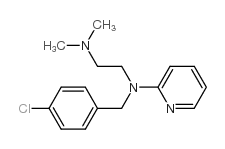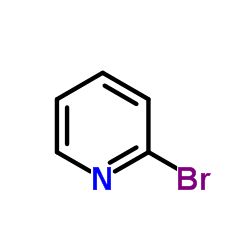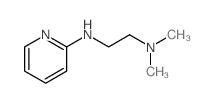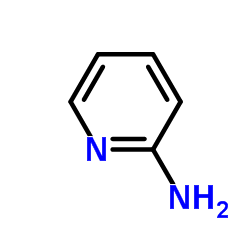Chloropyramine

Chloropyramine structure
|
Common Name | Chloropyramine | ||
|---|---|---|---|---|
| CAS Number | 59-32-5 | Molecular Weight | 289.80300 | |
| Density | 1.158g/cm3 | Boiling Point | 413.5ºC at 760 mmHg | |
| Molecular Formula | C16H20ClN3 | Melting Point | 25°C | |
| MSDS | N/A | Flash Point | 203.9ºC | |
Use of ChloropyramineChloropyramine is competitive reversible H1 receptor antagonist. Chloropyramine also has anti-tumour activity in breast cancer. Chloropyramine can be used for the research of allergic conditions, such as conjunctivitis and bronchial asthma[1][2]. |
| Name | N'-[(4-chlorophenyl)methyl]-N,N-dimethyl-N'-pyridin-2-ylethane-1,2-diamine |
|---|---|
| Synonym | More Synonyms |
| Description | Chloropyramine is competitive reversible H1 receptor antagonist. Chloropyramine also has anti-tumour activity in breast cancer. Chloropyramine can be used for the research of allergic conditions, such as conjunctivitis and bronchial asthma[1][2]. |
|---|---|
| Related Catalog | |
| Target |
H1 Receptor |
| In Vitro | Chloropyramine (25, 50 μM; 24 h, 48 h) induces SASH1 expression and apoptosis in breast cancer cell lines[1]. Western Blot Analysis[1] Cell Line: Breast cancer cell lines Concentration: 25 or 50 μM Incubation Time: 24 h Result: Increased SASH1 expression in breast cancer cell lines. Apoptosis Analysis[1] Cell Line: T47D, MDA-MB-231 and BT-54 cells Concentration: 50 μM Incubation Time: 48 h Result: Induced apoptosis in breast cancer cell lines. |
| In Vivo | Chloropyramine (i.p.; 10 mg/kg) abolishes hypothermia in rats[2]. Animal Model: Rats[2] Dosage: 10 mg/kg Administration: Intraperitoneal Result: Reduced histamine-induced hypothermia. |
| Density | 1.158g/cm3 |
|---|---|
| Boiling Point | 413.5ºC at 760 mmHg |
| Melting Point | 25°C |
| Molecular Formula | C16H20ClN3 |
| Molecular Weight | 289.80300 |
| Flash Point | 203.9ºC |
| Exact Mass | 289.13500 |
| PSA | 19.37000 |
| LogP | 3.30320 |
| Index of Refraction | 1.6 |
| Storage condition | 2-8°C |
CHEMICAL IDENTIFICATION
HEALTH HAZARD DATAACUTE TOXICITY DATA
|
| Hazard Codes | Xi |
|---|
|
~% 
Chloropyramine CAS#:59-32-5 |
| Literature: DE931828 , ; DRP/DRBP Org.Chem. |
|
~% 
Chloropyramine CAS#:59-32-5 |
| Literature: DE931828 , ; DRP/DRBP Org.Chem. |
|
~% 
Chloropyramine CAS#:59-32-5 |
| Literature: US2607778 , ; |
|
~% 
Chloropyramine CAS#:59-32-5 |
| Literature: Acta Chimica Academiae Scientiarum Hungaricae, , vol. 15, p. 265,269 |
|
~% 
Chloropyramine CAS#:59-32-5 |
| Literature: Acta Chimica Academiae Scientiarum Hungaricae, , vol. 15, p. 265,269 |
|
~% 
Chloropyramine CAS#:59-32-5 |
| Literature: Acta Chimica Academiae Scientiarum Hungaricae, , vol. 15, p. 265,269 |
| Chlorneoantergan |
| Avapena |
| Halopyramine |
| Anaphylline |
| Suprastin |
| Synpen |
| N-[(4-chlorophenyl)methyl]-N-[2-(dimethylamino)ethyl]pyridin-2-amine |
| Synopen |
| N-(4-Chlor-benzyl)-N',N'-dimethyl-N-<2>pyridyl-ethylendiamin |
| N-[(4-chlorophenyl)methyl]-N',N'-dimethyl-N-2-pyridinyl-1,2-ethanediamine |
| Chloropyramine |
| Chlorpyraminum |
| N-(4-Chlor-benzyl)-N',N'-dimethyl-N-[2]pyridyl-aethylendiamin |
| Chlorpyramine |
| N-(4-chloro-benzyl)-N',N'-dimethyl-N-[2]pyridyl-ethylenediamine |
| EINECS 200-421-1 |

![N-[(4-chlorophenyl)methyl]-N',N'-dimethylethane-1,2-diamine structure](https://image.chemsrc.com/caspic/448/65875-44-7.png)

![2-Pyridinamine,N-[(4-chlorophenyl)methyl]- structure](https://image.chemsrc.com/caspic/379/22881-33-0.png)
![4-chloro-thiobenzoic acid-[(2-dimethylamino-ethyl)-[2]pyridyl-amide] structure](https://image.chemsrc.com/caspic/368/109475-91-4.png)

![4-chloro-benzoic acid-[(2-dimethylamino-ethyl)-[2]pyridyl-amide] structure](https://image.chemsrc.com/caspic/334/101436-54-8.png)